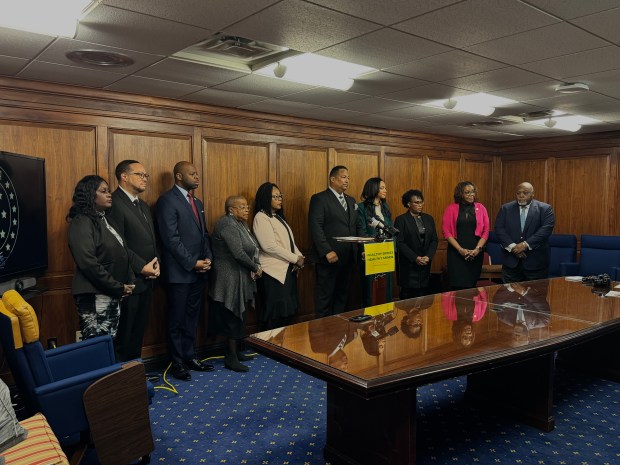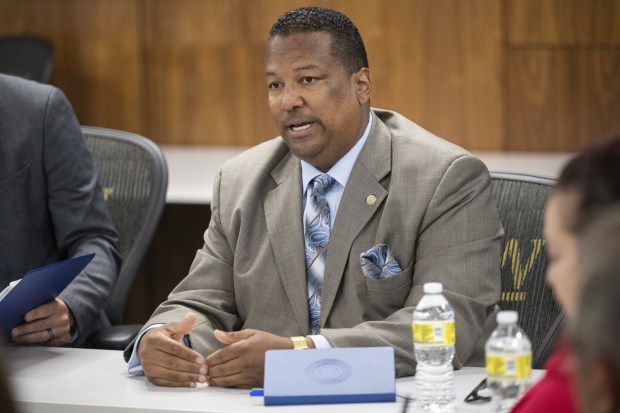The Indiana Black Legislative Caucus announced its Healthy Bodies, Healthy Minds 2025 legislative session agenda and shared insight on property taxes and an education bill that would impact Gary and Indianapolis.
Chair of the Indiana Black Legislative Caucus State Rep. Earl Harris Jr., D-East Chicago, said Indiana’s mortality rate is 16% higher than the national average, and that number has been compounded with an increase in drug overdose deaths in the last four years.
Hoosiers are more likely to have heart disease, obesity and diabetes compared to national averages, Harris said.
“The bottom line, Hoosiers should be better. It’s about time we in the state legislature start prioritizing our collective health,” Harris said.
While infant mortality and mortality in Indiana have been higher than the national average, Harris said the numbers are decreasing as more funding has been allocated to addressing the issues.
“This budget session, it’s time we put public health funding as a priority for the sake of all Hoosiers,” Harris said.
The Healthy Bodies, Healthy Minds agenda aims to increase access to health care, improve health outcomes for Hoosiers, bring more physicians to the state of Indiana and enhance funding for mental health care, Harris said.
The representatives filed a “momnibus” package in honor of the late Sen. Jean Breaux that would establish a state employee health plan to offer postpartum and mental health care for new mothers, tubal ligation and vasectomy, Harris said.
State Rep Earl Harris Jr., D-East Chicago, speaks during a Hispanic community roundtable at Purdue University Northwest on Wednesday, August 16, 2022. (Kyle Telechan for the Post-Tribune)
House Bill 1242, authored by State Rep. Vanessa Summers, D-Indianapolis, would ensure that medical debt could not lead to a lien placed on a property.
House Bill 1068, authored by Harris, would establish a medical school loan forgiveness pilot program to attract physicians to Indiana as long as they work in the state for 10 years.
House Bill 1199, authored by State Rep. John Bartlett, D-Indianapolis, would require a mental health professional to respond with police officers to 911 calls related to a mental health crisis or substance abuse.
“We’re not naive. We know we won’t fix all of Indiana’s health problems in one legislative session,” Harris said. “But this year, we’re committed to doing everything we can to help Hoosiers get access to preventative care, lower healthcare costs, bring more doctors to the state and to improve mental and physical health outcomes for citizens across the board.”
Safe housing relates to healthcare because without a safe place to live a person’s health is at risk, Harris said.
Rep. Robin Shackleford, D-Indianapolis, said as an insurance broker she met with a client to talk about healthcare coverage for her diabetes. When Shackleford met the client in her small apartment, which was within a house that was converted into smaller apartments, Shackleford said her client was storing her items in cooler-looking boxes because she had bedbugs.
Her client didn’t have properly running water in her apartment, Shackleford said. The building had cockroaches and the basement had rats, Shackleford said, adding that she’s working with the Marion County Public Health Department to address the problems she saw at the home.
“When we’re talking about health issues and housing, it goes hand in hand because as I’m sitting there talking to her about her health problems, about her diabetes, and trying to get her coverage, the housing situation is overshadowing even the health conversation,” Shackleford said.
As a budget year, legislators will have to reckon with maintaining Medicaid services amid an inaccurate projection by $984 million for its Medicaid expenditure forecast in April 2023. The missed projection was the result of state reversions and unanticipated growth of services for gaining and disabled residents.
The legislature will create a two-year budget to address Medicaid and determine how to spend $44 billion for schools, health insurance programs and infrastructure, among other fiscal issues.
“We know that money is going to be tight. There are multiple issues that are high priority issues, obviously healthcare being one of them,” Harris said.
Funding the efforts the Indiana Black Legislative Caucus has presented would help the state lower its Medicaid costs because the measures are preventative.
“If we can get on the front end and invest in it, then we can save more on the back end,” Shackleford said.

When it comes to education matters, House Bill 1136, authored by Rep. Jake Teshka, R-North Liberty, would be “an erosion of our public school systems,” said State Sen. Andrea Hunley, D-Indianapolis.
“It’s an attack on our public school systems,” Hunley said.
House Bill 1136 states if more than 50% of students residing within a school district’s boundaries were enrolled in schools not operated by the district as of Oct. 1 of the previous year, the district must be dissolved. After dissolution, all public schools within the district must be transitioned into charter schools.
The bill would also disband the school boards and establish a new seven-member board: four members appointed by the governor, one member appointed by the city’s mayor, one member appointed by the president of the fiscal body for the county, one member appointed by the executive director of the Indiana charter school board.
If passed, the bill would impact Indianapolis Public Schools, Gary Community Schools, Tri-Township Consolidated Schools in LaPorte County, Union Schools southeast of Munice, and Cannelton City Schools in Perry County.
Many members of the Indiana Black Legislative Caucus represent the districts impacted, Hunley said. The caucus has heard that the bill was drafted as “a bargaining chip,” she said.
“It’s being put out not as a bill that would pass, but as a threat of what could pass in order to negotiate on other issues,” Hunley said. “That’s not how we do legislation here in Indiana. We do not send entire communities into distress. We do not send teachers, and our most vulnerable students, our English language learners, our special education students, our families, into a panic because of the threat of disbanding school boards.”
School board members are elected by the residents, Harris said, so removing that takes away a community’s voice on education. A child’s education shouldn’t be used as a bargaining chip, Harris said.
“We should not bargain with our children’s education,” Harris said. “That’s incredibly insensitive.”
Governor Mike Braun has stated his administration would like to address property taxes. The Indiana Black Legislative Caucus recognizes that property taxes have become a burden for residents, particularly in cases where residents have paid off their home but lose it because they can’t afford the property taxes, Harris said.
Rep. Cherish Pryor, D-Indianapolis, said property taxes fund schools, public works, and many other municipal services. Whatever property tax plan is proposed, Pryor said legislators will have to ensure that those services would be funded.
But Pryor said legislators have heard from constituents that property taxes have become a burden.
“It certainly is going to be a delicate situation in how that is handled. But hopefully, we can come up with something that addresses the needs for everybody,” Pryor said.
akukulka@post-trib.com




